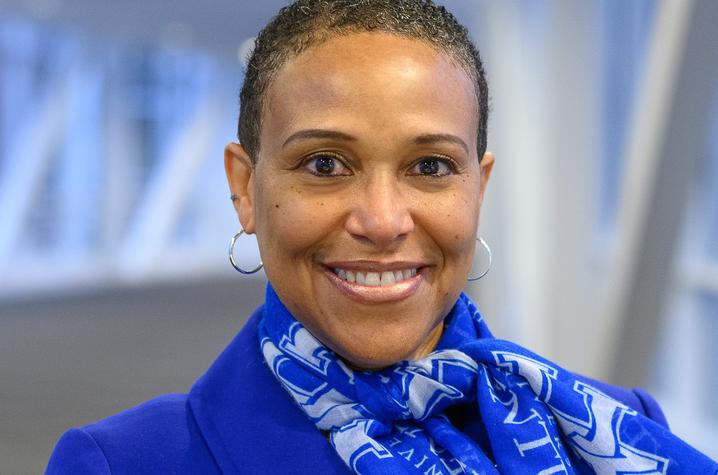Q&A: UK HealthCare Chief Diversity Officer Tukea Talbert

LEXINGTON, Ky. (Feb. 23, 2021) — Tukea Talbert is the Chief Diversity Officer at UK HealthCare. In this role, she oversees all Diversity, Equity and Inclusion (DEI) efforts across the entire health system. Another important component of Talbert’s position is connecting UK HealthCare’s DEI efforts with those of the University of Kentucky, and connecting those teams to the community.
“The time is now for us to make bold changes and sustainable actions in this space to impact not just our workforce, which is very key, but also the people that we care for every day from all walks of life,” said Talbert.
UKNow sat down with Talbert to ask some questions about the UK HealthCare DEI leadership council’s goals and how they are working to implement change here.
What made you want to get involved with DEI work?
About six years ago, an administrator had asked me to take the lead on UK HealthCare’s Diversity, Equity and Inclusion journey. While this was the official beginning, the seed was planted long before that conversation.
As a nurse, we hold ourselves accountable to provide culturally congruent care and advocate for patients from all backgrounds. This role empowers me to take this work and passion through multiple partnerships and key stakeholders to a whole new level. Because this work cannot be successful without the full engagement of the entire, team members hold the key to success. Our staff and faculty represent our most precious and powerful resource; and, I have the honor of working with them to achieve the outcomes of diversity, equity and inclusion.
One of my favorite quotes from Ruth Bader Ginsburg: “Fight for the things that you care about, but do it in a way that will lead others to join you.”
How is UK HealthCare’s DEI team working with the university’s DEI team to bring about change at this institution?
In my role as Chief Diversity Officer, it is one of my major responsibilities to make sure I’m optimizing the work we do in this space. It’s so important we achieve synergy with the campus work because that’s where we can have our big wins.
We launched the COVID-19 Vaccine Clinics to provide access to vulnerable populations in Lexington. Through partnering with community leaders, we were able to identify four locations that will result in 2,000 or more individuals receiving both a first dose and booster over an eight-week period.
My primary contact with the university is the Interim Vice President for the Office of Institutional Diversity, Dr. George Wright. Wright has been a key supporter of intentional communications and sharing of DEI projects and efforts through the DEI Implementation Leadership Team that he chairs. Our deliberate efforts around partnership demonstrates our solidarity to UK HealthCare, the university, and the community.
In Kentucky, a common misconception is that health disparities are only apparent in rural communities. However, BIPOC individuals experience disadvantages in the health care field often. How is UK HealthCare’s DEI team addressing this issue?
I think the awareness is there. COVID-19 has magnified the structural oppression and racism that has existed for centuries in Kentucky and nationally.
So much of the diversity, equity and inclusion work that we do, especially around health equity, is not only looking at how we address those issues, but how we define them for UK HealthCare. We are looking very diligently through our metrics and analyses of our data because you cannot have quality if you don’t have equity. We must incorporate what is commonly called data disaggregation.
Data disaggregation by race, ethnicity, and limited English proficiency, allows us to identify and quantify any disparities unique to these groups. This will allow us to execute targeted strategies and solutions to address the issues and impact change and improvements with the care of all of our patients including those most vulnerable.
Developing an anti-racist culture at an institution is crucial to its success. What are some ways everyone can contribute?
Everyone can contribute in some of the following ways:
- Be committed to self-education. We cannot reconcile what we do not know. Learning about the history and lived experiences of others helps provide context and cultural humility.
- People with privilege (we all have privileges of some kind) must be willing to use their privilege and become allies to individuals who may be marginalized, who experience microaggressions, and/or microinequities.
- Everyone must be constantly mindful of how our environment supports or inhibits inclusive excellence. Everyone must be an upstander and exercise self-accountability to speak up when inequities and/or injustices exist.
- Practice self-awareness and self-evaluation continuously because we all have biases, blind spots, and unique lived experiences that influence how we perceive people different than ourselves and our environment.
- Show grace and respect. Create safe psychological space (brave space) for crucial conversations about uncomfortable topics to identify our commonalities along with a path forward. Dismantling systemic racism starts at the individual and interpersonal level.
As the state’s flagship, land-grant institution, the University of Kentucky exists to advance the Commonwealth. We do that by preparing the next generation of leaders — placing students at the heart of everything we do — and transforming the lives of Kentuckians through education, research and creative work, service and health care. We pride ourselves on being a catalyst for breakthroughs and a force for healing, a place where ingenuity unfolds. It's all made possible by our people — visionaries, disruptors and pioneers — who make up 200 academic programs, a $476.5 million research and development enterprise and a world-class medical center, all on one campus.




